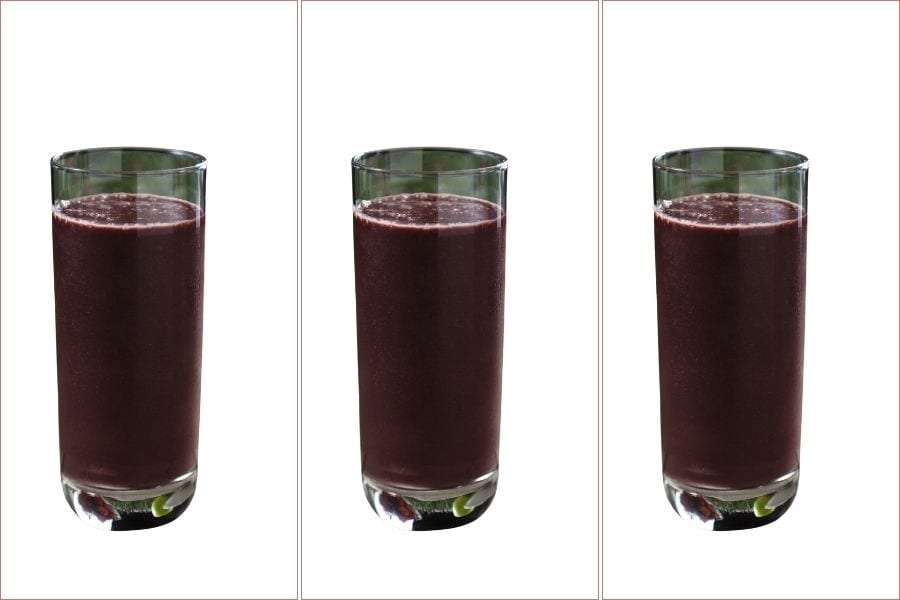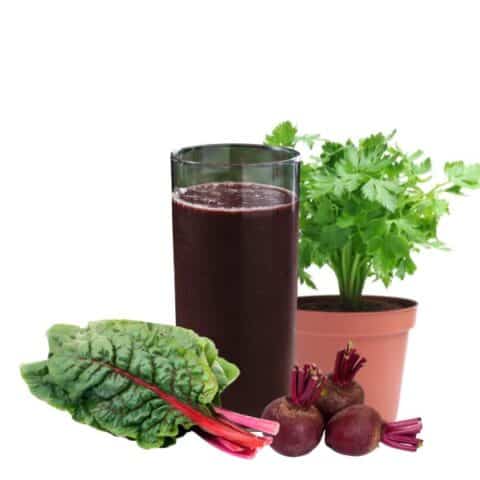Juicing For Anxiety (Control Levels With This Juice)
Juicing for anxiety is a great way to feel less anxious and calmer. Taking control and managing your anxiety better with simple and consistent steps is a must. And juicing is one of these easy steps. This juice recipe specifically uses foods that ease anxiety levels and take the edge off by using much-needed nutrients.

Consuming the right food combinations through an easily absorbed juice is a great way to lower cortisol levels and ease anxious feelings. A juice frequently works for me to quickly fix that uneasy, fluttering feeling.
When the body lacks certain nutrition, it gets out of whack. A juice delivers the vitamins and minerals quickly so the body can use them accordingly. One way it uses these nutrients is to produce chemicals that balance neurotransmitters.
This is a great juice recipe that some will feel the effects of instantly. Others may find it to be the pieces to a complex puzzle.
Making sure the ingredients used are not problematic for you is important otherwise the purpose of helping anxiety is defeated.
Also, rotating the juicing of fresh fruits and vegetables into your daily life can help with anxiety levels, mental clarity, balanced energy levels, and more.
If you experience anxiety attacks or think you may have an anxiety disorder, seek the help of an experienced doctor or health coach who uses a natural approach to healing. This can help you experience long-term effects with your anxiety symptoms.
anxiety-Relieving Juice Ingredients
Asparagus
Parsley
Swiss Chard
Zucchini
Beetroot
kale
Ginger root
plum (or sweet cherries or apple)
How Do these ingredients help anxiety?
These healthy foods offer nutrients that are shown to ease anxiety symptoms. These nutrients include:
- Vitamin Bs (specifically folic acid)
- Vitamin K
- Vitamin C
- Magnesium
- Zinc
- Omega 3s
Magnesium
This delicious juice recipe contains magnesium from the asparagus, parsley, zucchini, beetroot, and kale. However, the highest amount comes from the Swiss chard which has a very high amount of magnesium in one cup (the amount used in this recipe).
Folic Acid
Folic acid is also important when it comes to normalizing stress and anxiety levels. Evidence shows that when this form of vitamin B is low, anxiety and depressive levels are more likely to be higher.
Eating foods with folic acid is one way to increase levels. However, juicing distributes the vitamin directly to the body with less interference.
All of the above foods contain folic acid, also known as vitamin B9. Some are richer in this essential nutrient than others.
Vitamin C
Another beneficial vitamin that helps stabilize anxiety levels is vitamin C. The antioxidant compounds of this vitamin play an important role in brain functioning. It shows possible neuroprotective effects making it a great preventative nutrient. It also aids in maintaining a healthy central nervous system.
Disorders such as anxiety and depression are linked to the brain and cognitive health. Therefore, vitamins that keep the brain functioning healthy, such as vitamin C, are important to include into the diet regularly.
This vitamin is present in all of the foods included in this vegetable juice. it is especially high in kale and parsley.
Zinc
Furthermore, zinc also has been used in treatments to reduce anxiety symptoms. Studies show positive results when it comes to increasing zinc plasma levels in certain individuals.
As zinc levels rose, anxiety levels decreased according to studies. This shows a correlation between the amount of zinc a person has and anxious and panic-like feelings. Therefore, including zinc-containing foods into the diet with a juice recipe like this could be beneficial.
Omega 3s
Lastly, omega 3 fatty acids are needed for keeping the body calm and focused as well. Fatty acids make up a large portion of the brain.
Therefore, it makes sense that consuming foods with omega 3 benefits brain function. A calmer and more focused brain will naturally help with serotonin levels due to better communication between the brain and gut.
Asparagus, swiss chard, and kale all contain some omega 3s. Kale is higher in this nutrient than most plants. Therefore, including kale in this drink offers the body many benefits in fighting against anxiety problems.

Juice Recipe For Anxiety
A juice to reduce anxiety and ease the body from stress using the best anxiety-fighting ingredients.
Ingredients
- 2 Asparagus spears
- 1/2 cup Parsley
- 1 cup Swiss Chard
- 1/2 cup Zucchini
- 1/4 Beet Root
- 1 cup Kale
- 1/2 - 1 inch Ginger Root
- 1 or 2 Plums, depending on size (or 1 Apple or 1 cup Sweet Cherries, pitted)
Instructions
- Wash or rinse fruit accordingly
- Chop the asparagus, swiss chard, zucchini, beet, kale, and plum to fit into the juicer.
- Peel the ginger root
- Add foods into the juicer in the order given
- Pour the juice into a glass using a strainer
- Enjoy the juice immediately
- Alternatively, pour the juice up to the brim of a mason jar and secure it tightly. Place it in the refrigerator to drink later.
- You can substitute the apple or cherries for the plum depending on the season, accessibility to the fruit, or preference.
Nutrition Information:
Yield: 2 Serving Size: 1Amount Per Serving: Calories: 78Total Fat: 1gSaturated Fat: 0gTrans Fat: 0gUnsaturated Fat: 0gCholesterol: 0mgSodium: 187mgCarbohydrates: 17gFiber: 5gSugar: 9gProtein: 4g
The nutritional information respresents an an approximate calculated nutritional value. Reference other sources and calculate on your own to check for nutritional accuracy. UnderStory Healing is not liable for any information represented by the automated nutritional calculator.
This post Gives you an anxiety-relieving juice recipe that supplies your body with the much- needed nutrients to beat down anxiety symptoms.
Anxiety disorders are on the rise. Journaling is a healthy and productive way to lessen anxiety and stress. Getting thoughts out onto paper is a great technique if you are an anxious person or someone
Anxiety is the most common common mental health condition in America. Being informed will help you on your journey to getting anxiety under control. Here are 10 things to know about anxiety that will help
Looking for a boost in nutrients? You will find that in this parsley juicing recipe. High in vitamins A, K, and C, this vegetable juice provides you with many health benefits and flushes out free
Being anxious and depressed is a difficult state to be in. Knowing these 10 common deficiencies that cause anxiety and depression can help you get on the right track to feeling better. Become calmer and
Do you have digestive problems, want a quick dose of vitamins and minerals, or need more energy? Creating one of these 3 ingredient juicing recipes will help greatly with these things. Not only are these
Anxiety can consume a person and dictate their life. Showing you 5 Ways to Deal with Anxiety in your life naturally will guide you through the steps to get control over your anxiety. Dealing with
- Bettina Moritz, Ariana E. Schmitz, Ana Lúcia S. Rodrigues, Alcir L. Dafre, Mauricio P. Cunha,
The role of vitamin C in stress-related disorders, The Journal of Nutritional Biochemistry,
Volume 85, 2020, 108459, ISSN 0955-2863, https://doi.org/10.1016/j.jnutbio.2020.108459. - Liwinski, T., & Lang, U. E. (2023). Folate and Its Significance in Depressive Disorders and Suicidality: A Comprehensive Narrative Review. Nutrients, 15(17), 3859. https://doi.org/10.3390/nu15173859
- Bettina Moritz, Ariana E. Schmitz, Ana Lúcia S. Rodrigues, Alcir L. Dafre, Mauricio P. Cunha,
The role of vitamin C in stress-related disorders, The Journal of Nutritional Biochemistry, Volume 85, 2020, 108459, ISSN 0955-2863, https://doi.org/10.1016/j.jnutbio.2020.108459 - Azargoonjahromi A. A systematic review of the association between zinc and anxiety. Nutr Rev. 2024 Apr 12;82(5):612-621. doi: 10.1093/nutrit/nuad076. PMID: 37364014.
- Russo A. J. (2011). Decreased zinc and increased copper in individuals with anxiety. Nutrition and metabolic insights, 4, 1–5. https://doi.org/10.4137/NMI.S6349
- https://www.health.harvard.edu/mind-and-mood/omega-3s-for-anxiety